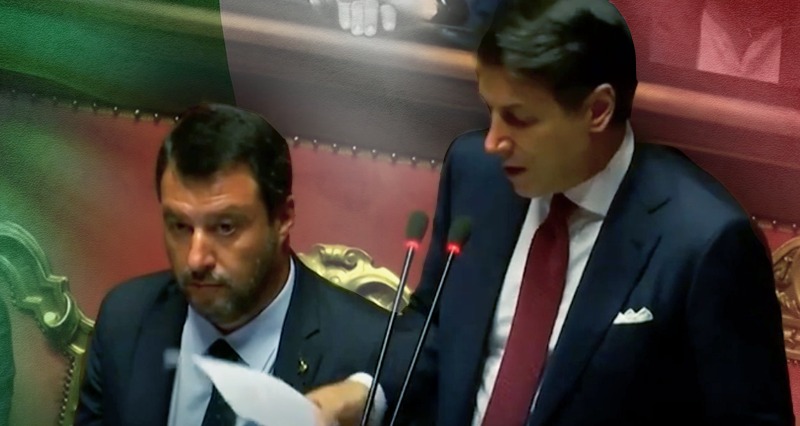On Tuesday, Giuseppe Conte, the Chairman of the Italian Council of Ministers, announced his resignation. In a speech before the Senate, he declared his intention to ask President Mattarella for permission to leave his office early.
Conte was all but forced into the decision by Deputy Prime Minister Matteo Salvini, who was about to initiate a no-confidence vote against the ruling coalition Conte heads.
The roots of the conflict
In his speech to the Senate, Conte criticized Salvini for his “irresponsibility,” and chastised him for intervening in the work of other ministers.
While many were surprised by Conte’s decision, the conflict has been germinating for some time.
The government had been in turmoil over issues such as Salvini’s efforts to toughen sanctions against humanitarian-aid ships that attempt to bring migrants rescued at sea into Italy illegally.
In connection with the disagreement, Salvini informed the prime minister that the ruling coalition had more or less ceased to exist, and demanded that early parliamentary elections be held.
According to the Italian Constitution, it is up to the head of state to dissolve parliament and call for new elections.
Salvini vs. the Deep State
UWI sat down with Alessandro Sansoni, the Director of Cultura Identità, who described Conte’s speech as a heinous act.
“Conte brutally attacked Salvini and even made things personal. President Mattarella evidently liked the speech and may have even been responsible for it. Conte’s criticism of Salvini’s job as Minister of the Interior was particularly harsh, and notably focused on immigration policy.”
The deep internal divisions in the government have finally become apparent on an official level, Sansoni said. Now, the head of state will begin consultations with various party leaders to find out if there is a majority in parliament ready to support the new government. This could put Salvini’s call for a no-confidence vote in jeopardy, despite his popular support.
Ora capisco i tanti no di questi mesi.
Ma dalle elezioni non si può scappare a vita.
Avanti senza paura, Amici! #primagliitaliani ????????
Live replay > https://t.co/HaCI5bjn9C— Matteo Salvini (@matteosalvinimi) August 20, 2019
“It seems that Salvini’s initiative to do away with the coalition government and run for office in an early election […] doesn’t quite coincide with the complex political and institutional architecture of the Italian system. In a sense, Salvini made a Hail Mary pass with his aggressive declaration. The move is rather dangerous: it’s not enough to have the support of the people if there are powerful people in the palace who are against you.”
Despite that Salvini seems to see himself as invulnerable in light of his popularity, Sansoni also noted that criticism has begun to emerge over the leader’s head-strong antics. Some are accusing him of “political immaturity” and “superficiality.”
“The risk for Salvini now, is that many of his enemies in the deep state are still hiding in the courts and the intelligence community, poised to launch a counter-attack which could take him out of the game altogether,” he continued.
It is hard to believe that the head of state would agree to hold early elections as Salvini is proposing. Some of the politicians who might be threatened by such a move have already begun taking steps to form a new majority composed of the Five Star Movement and the Democratic Party – a pro-EU, pro-migrant group. This temporary and unlikely alliance could allow the group to hold power for the next two years, at least until the next presidential elections, Sansoni said… but at what cost?
Sansoni made it clear that forming a coalition DP-M5 government will be far from easy, and will likely require a great deal of compromise.
“The country is still tending toward the political right. It seems likely that right-wing parties will resort to taking their opposition into the streets if a “left-oriented” government is formed, which could lead to further instability in the country.”
Geopolitical dimensions
According to Sansoni, the situation in Italy today is extremely chaotic.
“From an economic point of view, Italy will be unable to escape the ongoing crisis or find a way to increase its GDP as long as it continues to struggle under the high tax burdens and budget demands coming from Brussels. However, Italy’s internal problems also have a heavy impact at the geopolitical level.

MaxPixel
Italy serves as a crossroads, and, on occasion, a battleground, where tensions between major world powers (such as the US, China, Russia, Germany) find expression. This usually occurs as a result of international problems like the migration crisis that followed the Libyan civil war and the Arab Spring, when Italy became one of the main throughways for refugees fleeing to Europe. Italy has also become an important player in the international arena for US President Donald Trump, who wants Rome to serve as an outpost in his ongoing fight against the EU.
“Conte openly took a stand against sovereignty”
Philosopher Diego Fusaro told UWI that Tuesday had been a decisive day for the Senate – Conte’s speech officially marked the end of the “yellow-green populist laboratory.”
“Three different and decisive speeches were made by Conte, Renzi and Salvini. Renzi spoke out directly against populism; it was a speech of pure faith in EU cosmopolitanism and the liberal system. Salvini invoked the Madonna and popular sovereignty: if he had managed to distance himself somewhat from the monarchy of the dollar, it might have seemed more credible. The most important of the three, however, was Conte’s speech, which rightly criticized Salvini for triggering a governmental crisis, but also made it evident that the Five Star Movement is already leaning toward the Democratic Party, with which it will likely govern.”
“Conte openly took a stand against national sovereignty, dismissing it as nationalist sovereignty. This reassured the dominant system and the Democratic Party, who believe that Italy must remain subordinate to the EU and the US.”
“The formation of a coalition government made up of the Five Star Movement and Democratic Party is the worst possible outcome: this would signal the return to power of the representatives of globalism and the end of M5S,” he concluded.

















Leave a Reply